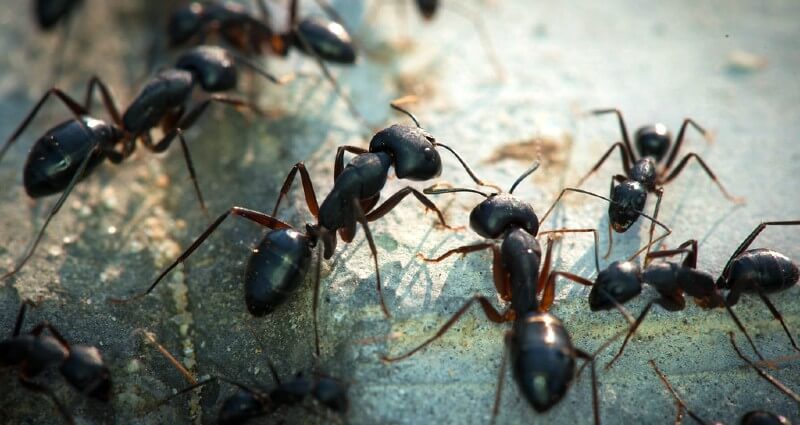Effective Ant Control: Specialist Services to Get Rid Of Ant Infestations
Effective Ant Control: Specialist Services to Get Rid Of Ant Infestations
Blog Article
Environmental Impact of Pest Control: Balancing Efficiency With Sustainability
The environmental impact of bug control is an important problem that calls for a fragile balance between achieving performance in making certain and handling pests sustainability of our ecosystems. As we strive to shield our crops, homes, and wellness from the hazards postured by parasites, the techniques we use can inadvertently harm the setting. From the usage of hazardous chemicals that permeate right into our soil and water to the unintentional repercussions on non-target types, the effects of traditional pest control techniques are far-reaching. Nonetheless, there are emerging approaches that use wish for a more lasting strategy to pest management. These remedies not only objective to deal with the instant bug problems yet additionally take into consideration the long-term health and wellness of our planet.
Harmful Chemicals in Insect Control
The usage of harmful chemicals in bug control postures significant ecological and wellness dangers that necessitate cautious factor to consider and mitigation approaches. Herbicides, insecticides, and chemicals are frequently utilized to eliminate bugs, but their extensive application can bring about unexpected repercussions. These chemicals can pollute soil, water resources, and the air, affecting not just the targeted bugs however additionally helpful pests, wild animals, and humans.

To address these threats, incorporated pest monitoring (IPM) methods are being promoted as a much more sustainable choice. IPM entails a combination of techniques such as biological control, habitat control, and the targeted use chemicals as a last resource (ant control hickory nc). By taking on an alternative strategy to pest control, we can reduce the environmental and health and wellness impacts connected with unsafe chemicals while successfully handling pest populations
Influence on Non-Target Variety
Taking into consideration the unintended effects of parasite control methods, the impact on non-target species is an important element that calls for comprehensive examination. While pest control steps intend to target details bugs, various other organisms in the ecological community may be inadvertently influenced. Non-target species, including helpful bugs, birds, mammals, and also plants, can endure direct or indirect harm from chemical applications or biological control methods.
Insecticides created to deal with a specific bug bug may harm pollinators like or natural killers such as ladybugs. Biological control representatives, if not species-specific, can posture threats to unplanned targets, interrupting the eco-friendly equilibrium.
To alleviate the influence on non-target varieties, incorporated insect administration (IPM) techniques that emphasize a holistic approach to pest control are recommended. These approaches prioritize the use of ecologically friendly practices, decreasing damage to beneficial organisms while properly managing pest populaces. Conducting detailed threat assessments and monitoring the outcomes of parasite control initiatives are vital actions in securing non-target types and promoting total environment health and wellness.
Dirt and Water Contamination
Unintentional ecological consequences of parasite control methods prolong beyond affecting non-target types, with substantial ramifications for dirt and water contamination - termite control services. Chemicals, herbicides, and chemical plant foods made use of in insect control can seep right into the soil and infect groundwater, posing a risk to both water and terrestrial ecological communities.
Water contamination is another crucial concern associated with insect control methods. Drainage from agricultural fields treated with chemicals can lug these chemicals into close-by water bodies, affecting marine organisms and water quality. Impurities in water resources can have significant repercussions, influencing not just aquatic life however additionally human health and wellness through the usage of infected water or marine organisms. To alleviate soil and water contamination from pest control tasks, integrated parasite management strategies that prioritize sustainability and minimize chemical inputs are vital.
Air Air Pollution From Pesticide Usage
Direct exposure to airborne pesticides during farming applications poses a significant issue for air contamination control actions. In addition, pesticide drift, where chemicals are carried by the wind to unplanned areas, can lead to the contamination of nearby ecosystems and water bodies.

Techniques for Sustainable Bug Control
In the realm of farming techniques, applying sustainable parasite control techniques is paramount for maintaining ecological balance and safeguarding plant returns. Sustainable bug control emphasizes the usage of eco friendly approaches to manage parasite populaces properly while minimizing harm to Read Full Report non-target microorganisms and ecosystems. Integrated Insect Administration (IPM) is an extensively adopted technique that combines organic, social, physical, and chemical control techniques to achieve long-term bug administration services.
Crop turning and diversity are also efficient strategies to interrupt pest life cycles and develop less beneficial conditions for pests to thrive. Ultimately, by incorporating these sustainable pest control methods, farmers can attain a balance in between pest management efficiency and environmental stewardship.
Verdict
In final thought, the ecological effect of insect control methods need to be meticulously taken into consideration to balance efficiency with sustainability. Hazardous chemicals made use of in parasite control can cause soil and water contamination, air contamination, and harm non-target types - termite control services. It is crucial to implement lasting bug control approaches to minimize these unfavorable results on the environment and advertise a healthier ecological community for future generations
By taking on a holistic strategy to pest control, we can decrease the ecological and health and wellness impacts connected with harmful chemicals while successfully handling pest populaces.

To mitigate the air pollution created by chemical usage, it is necessary to take on integrated parasite administration methods that prioritize the use of non-chemical pest control methods, such as crop rotation, natural predators, and resistant plant ranges. Lasting insect control highlights the use of environmentally pleasant methods to manage bug populations efficiently while decreasing harm to non-target organisms and ecological communities. Integrated Bug Management (IPM) is a widely adopted technique that combines organic, social, physical, and chemical control techniques to achieve long-lasting pest administration remedies.
Report this page